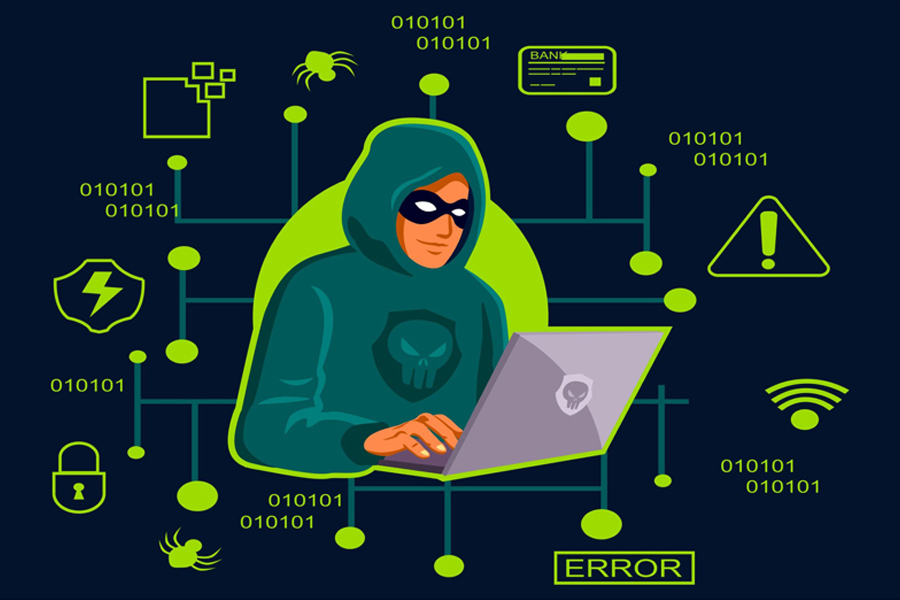
Published :
Updated :

In Shamsuddin Abul Kalam's Path Jana Nai, Jonabali builds a road connecting a secluded, remote village to nearby towns, hoping it will lead to progress and prosperity. While the road does bring some financial stability to the villagers, it also introduces price hike, famine, corruption and disease. That, in essence, describes what is happening today with the advancement of technology. The rapid growth of digital services has indeed expanded convenience and access, but it has also opened the door for financial scams and digital frauds.
Until recently, financial scams were not part of the everyday Bangladeshi experience. People encountered them mainly through movies or television dramas, more as entertainment than reality. But how times have changed! Today, financial scams are so widespread that people from all walks of life regularly fall victim to them. The sophistication of these schemes has evolved just as rapidly as the technology itself. In the past, a typical scam might involve late-night phone calls from individuals pretending to be jinns -- supernatural beings in Islamic belief -- offering promises of miraculous wealth. Today's scammers are far more cunning. They not only speak persuasively but also access personal information from the databases of various organisations, making their schemes disturbingly convincing.
One of the most prevalent scams today is the government office scam. This typically involves a call from an individual claiming to represent a government department, often equipped with specific personal details about the recipient. For instance, a caller might know that an individual performed Hajj the previous year, information likely gleaned from a government database. This precision immediately instils a sense of legitimacy. The caller then fabricates a story, such as a government refund for Hajj expenses, and requests sensitive financial information like debit or credit card details or mobile financial service (MFS) account credentials, subsequently moving on to asking for OTP code. Similarly, fake social welfare office scams target beneficiaries of government safety nets and prey on vulnerable groups such as the elderly, widows, disabled persons and members of small ethnic communities.
Another common tactic involves simpler, yet equally effective, schemes targeting MFS users. A scammer waits at a bKash agent point, watches a transaction and notes the recipient's number and amount. Moments later, he calls the recipient, pretending to be the bKash agent, and claims the money was accidentally sent twice. He then requests an OTP supposedly sent to the recipient's phone to "reverse" the error. Honest individuals, unaware of such deceptions, often comply without suspicion. Thus, these scammers exploit human emotions, ranging from benevolent impulses to greed, desire and even hope.
So how can people avoid falling victim to financial scams? Frank Abagnale, a former con artist turned anti-fraud consultant whose life inspired the film Catch Me If You Can, once said all scams share either of two fundamental red flags. The first is an immediate demand for money or payment. The second is a direct request for sensitive personal information, such as date of birth, banking details or credit card numbers. Recognising these red flags is the first line of defence which may help individuals identify fraudulent attempts.
Awareness campaigns, though necessary, have not been enough to shield people from the growing threat of financial scams. Banks and mobile financial services regularly send warnings to customers asking them not to reveal sensitive information like OTPs, PINs and passwords and card information. Yet these warnings, though well-intentioned, often fall short of providing real protection. Many users, particularly those without digital literacy, either disregard the warnings or do not fully grasp their implications.
When victims do realise they've been scammed, many go to police stations to file general diaries, hoping for redress and the recovery of their lost money. The sheer volume of reported cases, coupled with the digital nature of these crimes, presents considerable challenges. Since digital scams require no physical proximity, a scammer can operate from hundreds of kilometres away. When a local police station traces a scammer's location to another district, pursuing them becomes logistically difficult. It requires additional time, travel, official authorisation and funds, all of which are typically in short supply.
Legal loopholes further complicate the matter. Financial scams typically fall under clause 24 of the Cyber Security Act, 2023, which criminalises the misuse of digital tools to deceive or harm others. However, clause 52 of the same act categorises these offences as non-cognisable and bailable. In simple terms, this means the police cannot arrest suspects without a warrant, and even when arrests are made, scammers often secure bail to continue their illicit trade. This disheartens law enforcement agencies and emboldens criminals. Hence, many officers feel the effort just isn't worth it. The government has recently taken initiative to replace the Cyber Security Act, 2023 with the Cyber Security Ordinance, 2025. It remains to be seen whether the bailable and non-cognisable nature of scamming offences will be re-evaluated in the new ordinance.
Beyond legal measures, prevention remains far more effective than post-crime investigations. Just as personal information is vulnerable to theft, so too is sensitive data stored in government databases. The government must take concrete steps to secure its databases and tighten access controls. It must also invest in digital forensics and cross-district law enforcement cooperation to enhance response capability.
Above all, the most powerful tool against financial scams is education. These scams thrive due to a lack of financial literacy and a naive engagement with technology. People need to be clearly informed about how scams operate, the warning signs to look out for, and how to verify the legitimacy of anyone requesting money or personal information. Understanding basic principles such as never sharing OTPs or knowing that government offices never ask for PINs can make a significant difference. Without such awareness, individuals will remain vulnerable and continue to fall into the same traps.
shoeb434@gmail.com


 For all latest news, follow The Financial Express Google News channel.
For all latest news, follow The Financial Express Google News channel.